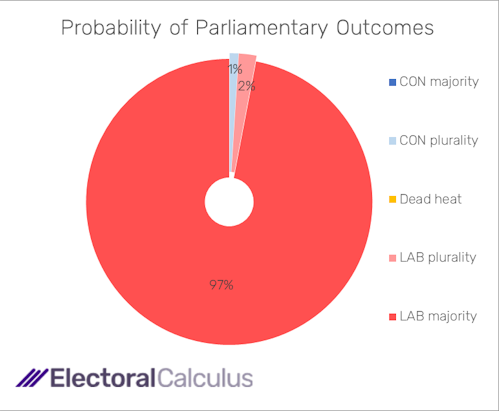While opinion poll trackers randomly show the Conservatives gaining or losing a few percentage points, the Electoral Calculus Seat Tracker continues to deliver a consistent message: the Conservatives are heading for a big defeat at the 4th July general election. The only question is: What's the size?
The most likely outcome is that the Conservatives will win less than 100 seats, the worst result in the party's history. This would reflect a squeeze in votes on the right from the aggressively anti-immigrant Reform Party and moderate Conservatives defecting to the Liberal Democrats as well as to Labour. This forecast is consistent with Rishi Sunak concentrating his campaign on Conservative-held seats in an effort to reduce the tide of losses.

The bittersweet news for Sunak is that there is a one in ten statistical chance that the party might do much better. This could happen if the snap timing of the election keeps the Reform Party from nominating candidates in a large number of Conservative seats where they could gain sufficient votes to give victory to the Liberal Democrats. The number of Reform candidates won't be known until nominations close on 7th June.
A collapse in Reform candidates could help the Tories win more than 200 seats. However, Sir Keir Starmer still would have a 97 percent probability of being on track to Downing Street. Labour would have a lead of more than 100 MPs over the Tories.
There is also a one in ten statistical chance that the Conservatives could be completely wiped out, taking no more than 37 seats. This theoretical outcome would make the Liberal Democrats the official Opposition party and put the Conservatives in third place, just ahead of the fourth-place Scottish National Party. It would not only end Rishi Sunak's career as prime minister but also his career as an MP, as he becomes vulnerable to losing his North Yorkshire constituency if the Tories are reduced to fewer than fifty MPs.
A Tory wipeout would not be the product of a surge in Labour support. Its safety-first campaign is designed to hold onto the 20-point poll lead it currently holds over the Conservatives. Nor would it reflect the Liberal Democrats gaining seats on a scale the party has not achieved since the 1920s. It would reflect Sunak launching a fresh appeal that, whatever its logic, would emulate Liz Truss's achievement of making Tory support wilt faster than lettuce.
Of course, Sunak can seek comfort in the fact that the dire news in the polls is based on a counter-factual, a general election being held in May rather than July. Likewise, his best grounds for claiming a massive recovery in the next five weeks comes from Charles Dickens' classic fictional character, Mr. Micawber. In the face of bankruptcy he took comfort in the belief something would turn up.
Prof Richard Rose, University of Strathclyde Glasgow, has been writing about elections for 65 years.